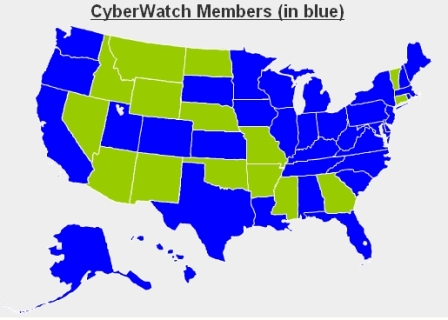WHAT'S NEW
- C3 Schools Award Program
- Cybersecurity Educator Academy
- CyberSTEM Educator Academy
History In October 2005 the National Science Foundation awarded a four year grant to Prince George’s Community College in Largo, Maryland to establish the CyberWatch Center. CyberWatch is one of three Advanced Technological Education (ATE) Centers focusing on information assurance education. In addition to CyberWatch, these include the Center for System Security and Information Assurance (CSSIA) at Moraine Valley Community College (Illinois) and the Cyber Security Education Consortium (CSEC) at the University of Tulsa. Initially, CyberWatch members were community colleges and universities in the metropolitan Washington DC area. Based on CyberWatch's success in curriculum, faculty, and student development, as well as outreach to additional colleges and business partners, NSF renewed the grant in September 2009. CyberWatch now has institutional members in numerous states plus Washington DC, supported by multiple agencies, associations, and businesses. The CyberWatch K12 Division extends the CyberWatch mission to the K12 community by expanding knowledge about Cyberawareness and workforce development/careers in CyberSecurity . The K12 Division is led by Educational Technology Policy, Research and Outreach (ETPRO), a research and development organization located in Maryland. ETPRO connects educational technology policy and research to instructional practice. ETPRO brings more than two decades of experience in the educational community, and more than a decade of experience in evaluating both formal and informal educational programs at the K-16 level, and conducting educational technology policy analysis. ETPRO’s expertise is founded on a combination of classroom practice across K-16 tied with a solid research base. ETPRO originated from the Educational Technology Outreach division of the College of Education, at the University of Maryland, and in 2007 was founded as an entrepreneurial entity committed to quality education for all learners, targeting the effective use of cutting edge technology in formal and informal educational settings to increase interest in Science, Technology, Engineering and Mathematics (STEM) fields. The fundamental gap between technology use and understanding of proper practices, lead ETPRO to the forefront of research, program evaluation and development of Cyberethics, Cybersafety, and CyberSecurity (C3®) initiatives. In addition to leading CyberWatch on Cyberawareness initiatives, ETPRO promotes C3 local, state, and federal initiatives through consultant work, program evaluation and on an advisory board capacity for Colleges and Universities, local school systems, and multiple Tier one Internet Safety curriculum providers. The CW program curriculum is based on the Young Scholars Program (YSP) content, Students, Learning and Technology, developed by Pruitt-Mentle, initiated in 2001 at the University of Maryland, College of Education. The YSP is a campus wide initiative to attract high school students to pursue academic interests, explore career opportunities, earn three college credits, and discover campus life at the University of Maryland. Each college developed a signature program. The purpose of the College of Education’s program was to foster excellence in 21st century skills to help students succeed in college, and prepare themselves with the skills necessary to meet the shifting and constantly changing demands of the future workplace. Students gained valuable skills related to digital literacy while exploring career opportunities related to the STEM fields. Students investigated the design and use of games and simulations for educational purposes, the research and development issues associated with each, and experience various modeling and simulation software packages (MicroWorlds, Excel, RoboLab, Scratch, GoogleSketchUp, StarLogo and other open source applications). Through the NSF funded CW ATE grant, a similar program was developed specifically exploring career opportunities related to CyberSecurity . Materials were developed, piloted, evaluated, and adjusted. Due to its popularity, the summer program for high school students grew to five programs in four Maryland counties in 2009, which has led to the development of year round after school programs for both elementary and middle schools, and several high school cryptography clubs. After school and summer programs continue to expand throughout Maryland, and other CW member states. |

